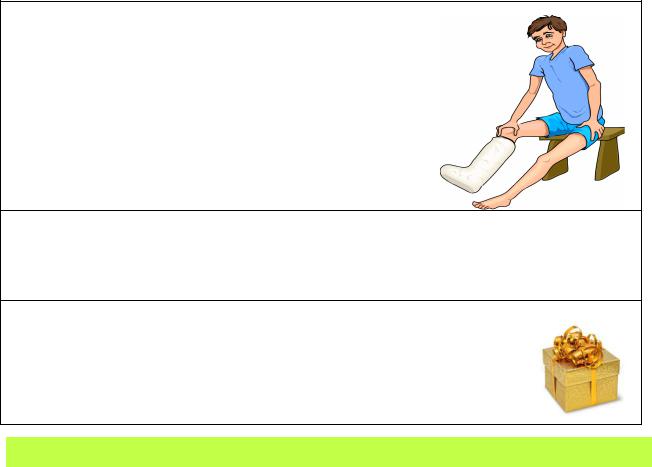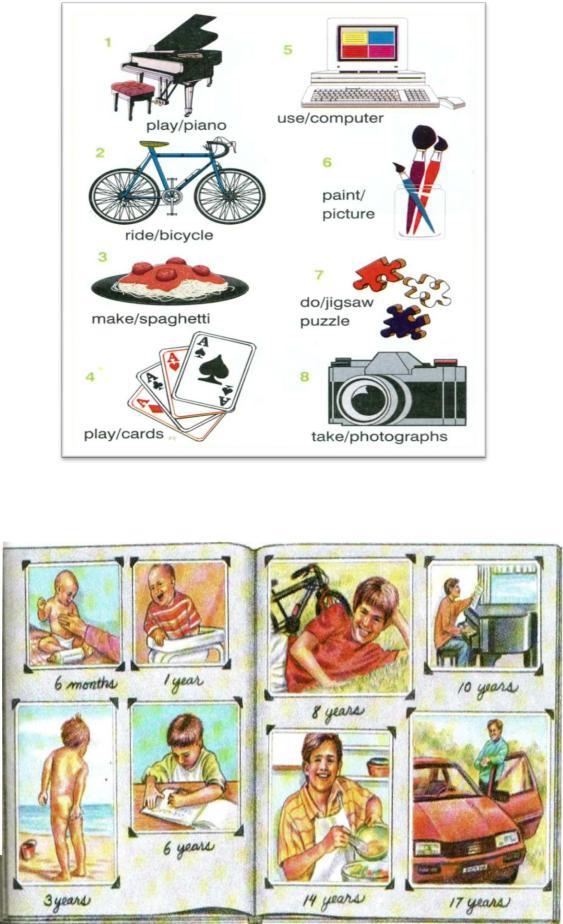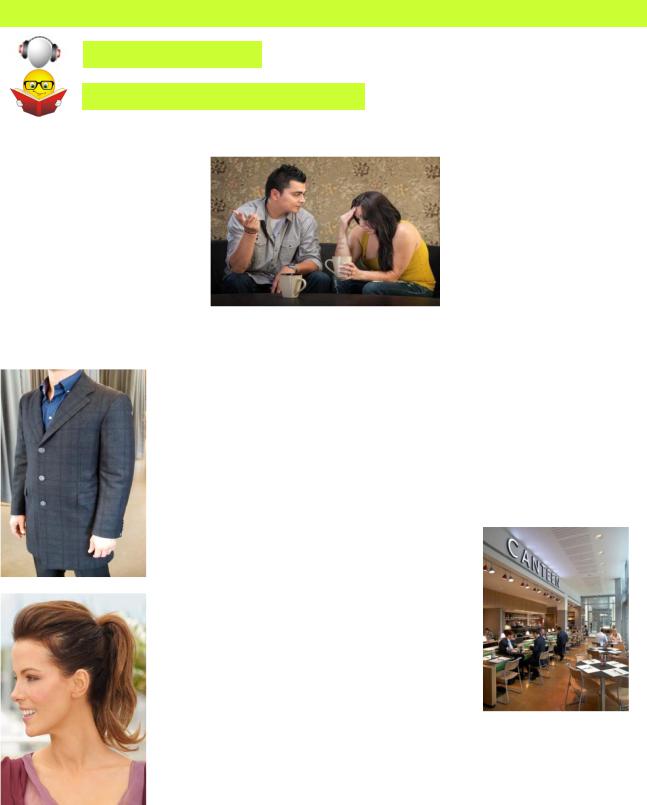
Rogozina_up2
.pdf
My daughter could not write when she was three.
Моя дочь не умела писать, когда ей было три года.
GRAMMAR
ОБОРОТ TO BE ABLE TO
Модальный глагол can может заменяться эквивалентом to be able to (быть в состоянии / мочь).
To be able to несколько отличается по своему значению от модального глагола can. Eсли саn обозначает способность/возможность совершать
действие вообще, то оборот to be able to – возможность совершить действие в данном конкретном случае, в данное определенное время.
PAST SIMPLE
Различие между глаголом can и его эквивалентом to be able to особенно проявляется в прошедшем времени.
COULD |
WAS/ WERE ABLE TO |
|
|
|
|
ВООБЩЕ |
В ДАННОМ КОНКРЕТНОМ |
|
СЛУЧАЕ |
||
|
||
When I was in the |
When I was in the |
|
USA I could see |
USA I was able to |
|
American movies on |
see «Gone with the |
|
TV. |
Wind». [wɪnd] |
|
Когда я был в США, я мог смотреть |
Когда я был в США, я смог |
|
американские фильмы по ТВ. |
посмотреть «Унесенные ветром». |
52

ОБРАТИТЕ ВНИМАНИЕ:
1.В прошедшем времени в отрицании в обоих случаях чаще используется модальный глагол could в отрицательной форме couldn’t.
He was so surprised that he couldn’t say a word.
Он так удивился, что не смог сказать ни слова.
2.С глаголами see, hear, feel, smell, taste, understand, remember, guess [ges] в прошедшем времени используется только модальный глагол could (никогда was/ were able to!)
I could feel that something was wrong the moment I came into the room.
Я почувствовал, что что-то не так, как только вошел в комнату.
PRESENT SIMPLE
В настоящем времени для обозначения способности совершать действия и «вообще» и «в данном конкретном случае», как правило, употребляется модальный глагол can.
ВООБЩЕ |
В ДАННОМ КОНКРЕТНОМ |
|
СЛУЧАЕ |
||
|
||
I can play tennis very well. |
I can play tennis right now. |
|
Я могу сыграть теннис прямо |
||
Я очень хорошо умею играть в теннис. |
||
сейчас. |
||
|
ОБРАТИТЕ ВНИМАНИЕ:
В некоторых случаях, когда необходимо противопоставить способность к совершению действия «вообще» и «в данном конкретном случае», используется эквивалент am/ is/ are able to.
CAN |
AM/ IS/ ARE ABLE TO |
|
|
|
|
ВООБЩЕ |
В ДАННОМ КОНКРЕТНОМ |
|
СЛУЧАЕ |
||
|
53

He can play football well, but is not able to play it today
because he has hurt his leg.
Он хорошо играет в футбол, но сегодня не может этого сделать,
так как поранил ногу.
FUTURE SIMPLE
Для обозначения способности совершить действие в будущем используется will be able to.
I will be able to buy a present for my girlfriend tomorrow.
Завтра я смогу купить подарок своей девушке.
TO BE ABLE TO (PRESENT SIMPLE)
В Present Simple оборот to be able to имеет следующие формы:
число / |
Утвердительная |
Отрицательная форма |
Вопросительная |
|
лицо |
форма |
|
форма |
|
|
|
|
|
|
1 |
л. ед. ч. |
I am able to do |
I am not able to do |
Am I able to do? |
2 |
л. ед. ч. |
You are able to do |
You are not able to do |
Are you able to do? |
|
|
He is able to do |
He is not able to do |
Is he able to do? |
3л. ед. ч. |
She is able to do |
She is not able to do |
Is she able to do? |
|
1 |
л. мн. ч. |
We are able to do |
We are not able to do |
Are we able to do? |
2 |
л. мн. ч. |
You are able to do |
You are not able to do |
Are you able to do? |
3 |
л. мн. ч. |
They are able to do |
They are not able to do |
Are they able to do? |
|
|
|
|
|
|
В Past Simple оборот to be able to имеет следующие формы: |
|||
|
|
|
|
|
число / |
Утвердительная |
Отрицательная форма |
Вопросительная |
|
лицо |
форма |
|
форма |
|
|
|
|
|
|
1 |
л. ед. ч. |
I was able to do |
I was not able to do |
Was I able to do? |
2 |
л. ед. ч. |
You were able to do |
You were not able to do |
Were you able to do? |
|
|
He was able to do |
He was not able to do |
Was he able to do? |
3л. ед. ч. |
She was able to do |
She was not able to do |
Was she able to do? |
|
|
|
|
|
|
|
|
|
54 |
|

1 |
л. мн. ч. |
We were able to do |
We were not able to do |
Were we able to do? |
|
2 |
л. мн. ч. |
You were able to do |
You were not able to do |
Were you able to do? |
|
3 |
л. мн. ч. |
They were able to do |
They were not able to do |
Were they able to do? |
|
|
|
|
|
|
|
|
Во Future Simple оборот to be able to имеет следующие формы: |
||||
|
|
|
|
|
|
число / |
Утвердительная |
|
Отрицательная |
Вопросительная |
|
лицо |
форма |
|
форма |
форма |
|
|
|
|
|
|
|
1 |
л. ед. ч. |
I will be able to do |
|
I will not be able to do |
Will I be able to do? |
2 |
л. ед. ч. |
You will be able to do |
|
You will not be able to do |
Will you be able to do? |
|
|
He will be able to do |
|
He will not be able to do |
Will he be able to do? |
3л. ед. ч. |
She will be able to do |
|
She will not be able to do |
Will she be able to do? |
|
1 |
л. мн. ч. |
We will be able to do |
|
We will not be able to do |
Will we be able to do? |
2 |
л. мн. ч. |
You will be able to do |
|
You will not be able to do |
Will you be able to do? |
3 |
л. мн. ч. |
They will be able to |
|
They will not be able to do |
Will they be able to do? |
|
|
do |
|
|
|
|
|
|
|
|
|
VI. EXERCISES
1. Define the meaning of the verb can and translate the sentences.
1.Can you speak Spanish? 2. Can I borrow your pencil for a moment? 3. Can your brother help me with mathematics? 4. Could you come to my place next Friday? – I‟m sorry. I can‟t. 5. When we went into the house we could smell something burning. 6. Could I talk to you for a minute, please? 7. When Joe was 16, he could run 100 meters in 11 seconds. 8. Can I watch the late film tonight, Mum? 9. Can you bring me a glass of water? 10. Susan can’t walk because she has broken her leg.
11.Can you answer the phone, please? 12. Could I ask you a question, madam? 13. You can have some more tea if you want. 14. Can you shut the window, please?
2.Make the sentences negative and interrogative.
1.Mike could run very fast five years ago. 2. They can understand French. 3. Kate could speak English well when she was ten. 4. My brother can come and help you in the garden. 5. His little sister could read when she was five. 6. The children can carry this box. 7. My Grandma can cook very well. 8. Jessica could dance tango. 9. I can answer the questions. 10. I can afford this trip. 11. Sally could speak well on the telephone. 12. Peter Green can find a good job. 13.
Bill will be able to meet you at the airport tomorrow. 14. They will be able to finish the project before Christmas. 15. You will be able to find my house. 16. Linda will be able to join us today. 17. We will be able to stay with you for two weeks. 18.
Peter and Paul were able to go to the football match yesterday. 19. My sister was
55

able to pass her English exam last week. 20. Oliver was able to recognize his aunt and uncle at the airport.
3. Mr. Roberts is 65 years old. What could he do in his youth and what can’t he do now? Make sentences.
Example: play volleyball. - Не could play volleyball but now he can't.
1.dive ……………………………………………………
2.do a headstand ……………………………………...…
3.dance all night ………………………………………………………………………
4.eat a lot ……………………………………………………………………………...
5.work late……………………………………………………………………………..
6.walk for miles ……………………………………………………………………….
7.lift heavy things ……………………………………………………………………..
8.drive a car very fast …………………………………………………………………
4. Use can, can't, could or couldn't.
1. |
Sarah is three years old. She ...can't... |
write. |
|
2. |
Peter is nineteen. He .......... |
drive a car. |
|
3. Mr. Thompson is 70 years old. He ........... |
see very well |
||
so he wears glasses. |
|
|
|
4. |
When I was five years old, I .............. |
only count to ten. |
|
5. |
When Kate was two, she ............. |
read a newspaper. |
|
6. |
................ |
you answer the phone, please? |
|
7. |
It was cold yesterday so we ............... |
go out. |
|
8. |
I .............. |
walk when I broke my leg. |
|
9. |
................ |
I take this pencil, please? |
|
10 |
. ............. |
you sing when you were a small child? |
|
5. You are in your friend’s flat. Ask your friend for permission to do the following things.
Example: take your pen - Can I take your pen, please?
1.open the window……………………………………………………………………
2.get a glass of water………………………………………………………………….
3.switch on the TV…………………………...……………………………………….
4.use your computer………………………………………..…………………………
5.move this chair…………..…………………………………………………………
6.use the bathroom ……………………………………………………………………
7.shut the door ………………………………………………………………………...
8.read the paper ………………………………………………………………………..
9.have a cup of tea …………………………………………………………………….
10.make a sandwich …………………………………………………………………...
56

6. Work in pairs. Ask each other questions using the pictures.
Example: Could you play the piano when you were six? - Yes, I could / No, I couldn't.
7. Look at Oliver’s photo album and discuss what he could and couldn’t do when he was a child.

8. Complete the sentences with could/couldn’t or was/were able to.
1.She … sing beautifully in her childhood.
2.She wasn't at home when I called, but I … contact her at her office.
3.My father … meet me at the airport yesterday, because he was busy in the office.
4.I looked everywhere for the book but I … find
it.
5.They didn‟t have any tomatoes in the first shop, but I … find them in the next shop.
6.Tom … drive but he didn‟t have a car.
7.I … understand English and German when I was a child.
8.She can‟t run very fast now, but when she was at school she … run faster than her friends.
9.Jack was an excellent tennis player, he … beat anyone.
10.When I arrived, I … see a few people waiting for the train.
11.I … hear what they were saying because the music was too loud.
9. Use the prompts to react to the situations.
Example: Peg can‟t call you tonight (tomorrow). – I hope she will be able to call tomorrow.
1.Bob can‟t come to the party (next Saturday).
2.They can‟t repair my car (by the end of the month).
3.My dad can‟t come to school tomorrow (next week).
4.They can‟t translate this text without a dictionary (next year).
5.Ann can‟t do this work today (tomorrow).
6.George can‟t go to Spain this summer (next summer).
7.He can‟t get a good job (before summer is over).
8.She can‟t dance very well (in about a month).
9.She can‟t visit you tonight (on Monday).
10.We can‟t have a barbecue today (tomorrow).
58

10. Look at the picture of this family. Then use the prompts to make sentences.
Example: They can’t enjoy peace and quiet now. When the children grow up, they will be able to enjoy peace and quiet.
1.enjoy peace and quiet
2.go out in the evenings
3.do lots of sports
4.visit their friends often
5.go to the theatre with their friends
6.relax on the beach
7.read new books and magazines
8.travel to exotic countries
9.spend time on their own
6.Translate the sentences.
A.1. Моя сестра умеет плавать, но не умеет кататься на лыжах. 2. Ты умеешь говорить по-японски? 3. Она не умеет водить автомобиль. 4. Мой дедушка мог кататься на велосипеде, когда он был молодым, но теперь он не может. 5. В прошлом году Боб не умел играть в теннис, а сейчас умеет. 6. Не могли ли бы вы мне помочь? 7. Я не могу перевести это предложение.
8. Миссис Готтман умела танцевать, когда она училась в школе? 9. Можно мне позвонить? 10. Все студенты
умеют пользоваться компьютером.
B. 1. Мы не сможем провести вместе Рождество. 2. Мой брат сможет пробыть у нас три недели. 3. Они смогли узнать его, когда встретились. 4. Я не смогу встретить вас в аэропорту, так как буду занят. 5. Tом и Барбара смогли пойти на вечеринку?. 6. Когда вы сможете отвезти нас в Оксфорд? 7. Где он смог найти эту книгу.
59

UNIT 5
A JOB INTERVIEW
60

I. LISTENING AND READING
Listen to the text
Read and translate the text
A JOB INTERVIEW
Jake is telling Sylvia about his interview for a job in a car showroom.
“The manager said that employees must wear clean, smart clothes while they are at work. They mustn’t wear jeans or trainers! They mustn’t smoke or drink in any part of the building, and they must eat all their meals in the canteen. They mustn’t have anything but coffee, tea, or soft drinks at their workstations.
They must keep their hair clean and neat, and tied back if it‟s longer than the shoulder. All the men must be cleanshaven, and the women mustn’t wear too much make-up, but they needn’t avoid it altogether.
Employees must be polite and courteous to the public, but they need
not tolerate abuse. He said if they find themselves in a difficult situation, they must immediately call a manager to deal with it. I didn‟t like the sound of it! I don‟t think I‟ll take the job.”
|
|
II. NOTES |
|
|
|
|
|
|
|
|
|
|
Jake [ʤeɪk] |
Джейк (уменьш. от Jacob) |
|
|
|
|
|
|
Sylvia ['sɪlvɪə] |
Сильвия |
|
|
|
|
|
|
|
61 |
|
